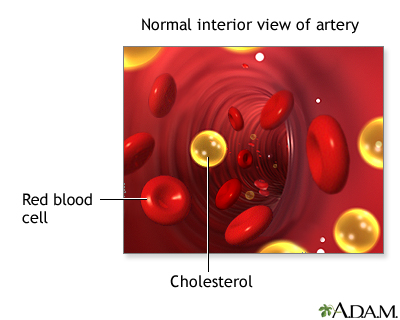Health Topics
Cholesterol is a soft, wax-like substance found in all parts of the body. Your body needs cholesterol to work properly. But too much cholesterol can clog your arteries and lead to heart disease.

Cholesterol blood tests are done to help you and your health care provider better understand your risk for heart disease, stroke, and other problems caused by narrowed or blocked arteries.
The ideal values for all cholesterol results depend on whether you already have heart disease, diabetes, or other risk factors. Your provider can tell you what your goal should be.
Cholesterol Tests
Some types of cholesterol are considered good and some are considered bad. Different blood tests can be done to measure each type of cholesterol.
Your provider may order only a total cholesterol level as the first test. It measures all types of cholesterol in your blood.
You may also have a lipid (or coronary risk) profile, which includes:
- Total cholesterol
- Low density lipoprotein (LDL cholesterol)
- High density lipoprotein (HDL cholesterol)
- Triglycerides (another type of fat in your blood)
- Very low density lipoprotein (VLDL cholesterol)
Lipoproteins are made of fat and protein. They carry cholesterol, triglycerides, and other fats, called lipids, in the blood to various parts of the body.
When Should You Be Tested?
Everyone should have their first screening test by age 35 for men, and age 45 for women. Some guidelines recommend starting at age 20 or even earlier depending on a person's overall health.
You should have a cholesterol test done at an earlier age if you have:
- Diabetes
- Heart disease
- Stroke
- High blood pressure
- A strong family history of heart disease
Follow-up testing should be done:
- Every 5 years if your results were normal.
- More often for people with diabetes, high blood pressure, heart disease, stroke, or blood flow problems to the legs or feet.
- As your provider recommends if you are taking medicines to lower your cholesterol.
Total Cholesterol
A total cholesterol of less than 200 mg/dL (5.18 mmol/L) is considered best (lower numbers are better).
You may not need more detailed cholesterol tests if your cholesterol is in this normal range.
LDL (Bad) Cholesterol
LDL cholesterol is sometimes called "bad" cholesterol. LDL can clog your arteries.
You want your LDL to be low. Having too much LDL is linked to heart disease and stroke.
Your LDL is always considered to be too high if it is 190 mg/dL (4.92 mmol/L) or higher.
Levels from 70 to 189 mg/dL (1.81 to 4.90 mmol/L) are most often considered too high if:
- You have diabetes and are between ages 40 to 75
- You have diabetes and a high risk of heart disease
- You have a medium or high risk of heart disease
- You have heart disease, history of a stroke, or poor circulation to your legs
In these circumstances, your provider will often recommend medicine to lower your LDL cholesterol level.
Providers have traditionally set a target level for your LDL cholesterol if you are being treated with medicines to lower your cholesterol.
- Some newer guidelines now suggest that providers no longer need to target a specific number for your LDL cholesterol. Higher strength medicines are used for the highest risk patients.
- However, some guidelines still recommend using specific targets.
HDL (Good) Cholesterol
You want your HDL cholesterol to be high. Studies of both men and women have shown that the higher your HDL, the lower your risk of coronary artery disease. This is why HDL is sometimes referred to as "good" cholesterol.
HDL cholesterol levels greater than 60 mg/dL (1.55 mmol/L) are desired, though even higher is better.
VLDL (Bad) Cholesterol
VLDL contains the highest amount of triglycerides. VLDL is considered a type of bad cholesterol because it helps cholesterol build up on the walls of arteries.
Normal VLDL levels are less than 30 mg/dL (0.78 mmol/L).
Considerations
Sometimes, your cholesterol levels may be low enough that your provider will not ask you to change your diet or take any medicines.
Alternative Names
Cholesterol test results; LDL test results; VLDL test results; HDL test results; Coronary risk profile results; Hyperlipidemia-results; Lipid disorder test results; Heart disease - cholesterol results
Images
References
American Diabetes Association Professional Practice Committee. 10. Cardiovascular disease and risk management: standards of care in diabetes-2025. Diabetes Care. 2025;48(Supplement_1):S207-S238. PMID: 39651970 pubmed.ncbi.nlm.nih.gov/39651970/.
Arnett DK, Blumenthal RS, Albert MA, et al. 2019 ACC/AHA Guideline on the primary prevention of cardiovascular disease: executive summary: a report of the American College of Cardiology/American Heart Association Task Force on Clinical Practice Guidelines. Circulation. 2019;140(11):e563-e595. PMID: 30879339 pubmed.ncbi.nlm.nih.gov/30879339/.
Gennest J, Mora S, Libby P. Lipoprotein disorders and cardiovascular disease. In: Libby P, Bonow RO, Mann DL, Tomaselli GF, Bhatt DL, Solomon SD, eds. Braunwald's Heart Disease: A Textbook of Cardiovascular Medicine. 12th ed. Philadelphia, PA: Elsevier; 2022:chap 27.
Grundy SM, Stone NJ, Bailey AL, et al. 2018 AHA/ACC/AACVPR/AAPA/ABC/ACPM/ADA/AGS/APhA/ASPC/NLA/PCNA Guideline on the management of blood cholesterol: a report of the American College of Cardiology/American Heart Association Task Force on Clinical Practice Guidelines. J Am Coll Cardiol. 2019;73(24):3168-3209. PMID: 30423391 pubmed.ncbi.nlm.nih.gov/30423391/.
Robinson JG. Disorders of lipid metabolism. In: Goldman L, Cooney KA, eds. Goldman-Cecil Medicine. 27th ed. Philadelphia, PA: Elsevier; 2024:chap 190.
US Preventive Services Task Force; Mangione CM, Barry MJ, et al. Statin use for the primary prevention of cardiovascular disease in adults: US Preventive Services Task Force Recommendation Statement. JAMA. 2022;328(8):746-753. PMID: 35997723 pubmed.ncbi.nlm.nih.gov/35997723/.
US Preventive Services Task Force; Barry MJ, Nicholson WK, et al. Screening for lipid disorders in children and adolescents: US Preventive Services Task Force Recommendation Statement. JAMA. 2023;330(3):253-260. PMID: 37462699 pubmed.ncbi.nlm.nih.gov/37462699/.
Review Date 1/1/2025
Updated by: Michael A. Chen, MD, PhD, Associate Professor of Medicine, Division of Cardiology, Harborview Medical Center, University of Washington Medical School, Seattle, WA. Also reviewed by David C. Dugdale, MD, Medical Director, Brenda Conaway, Editorial Director, and the A.D.A.M. Editorial team.




